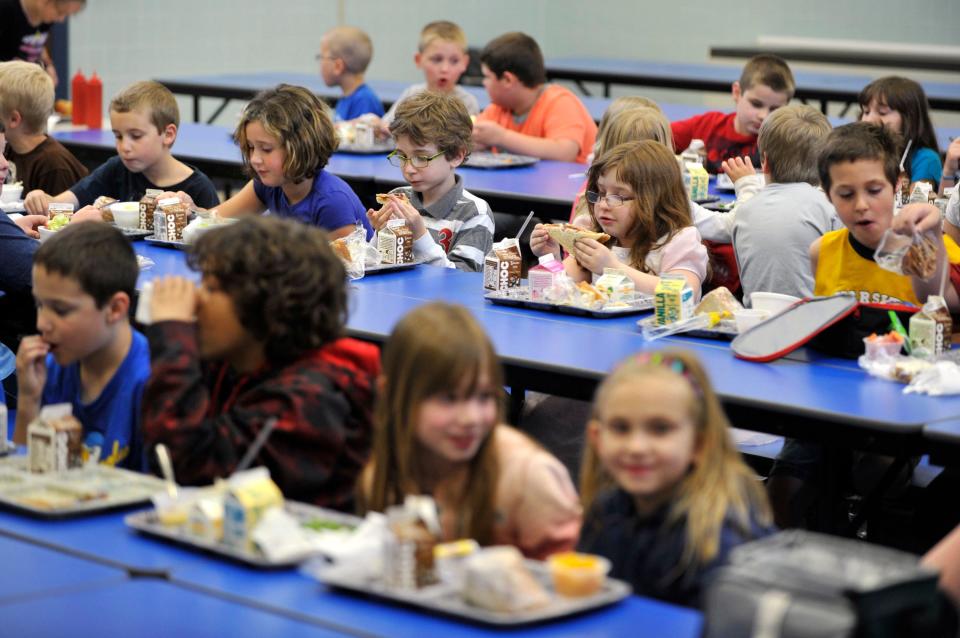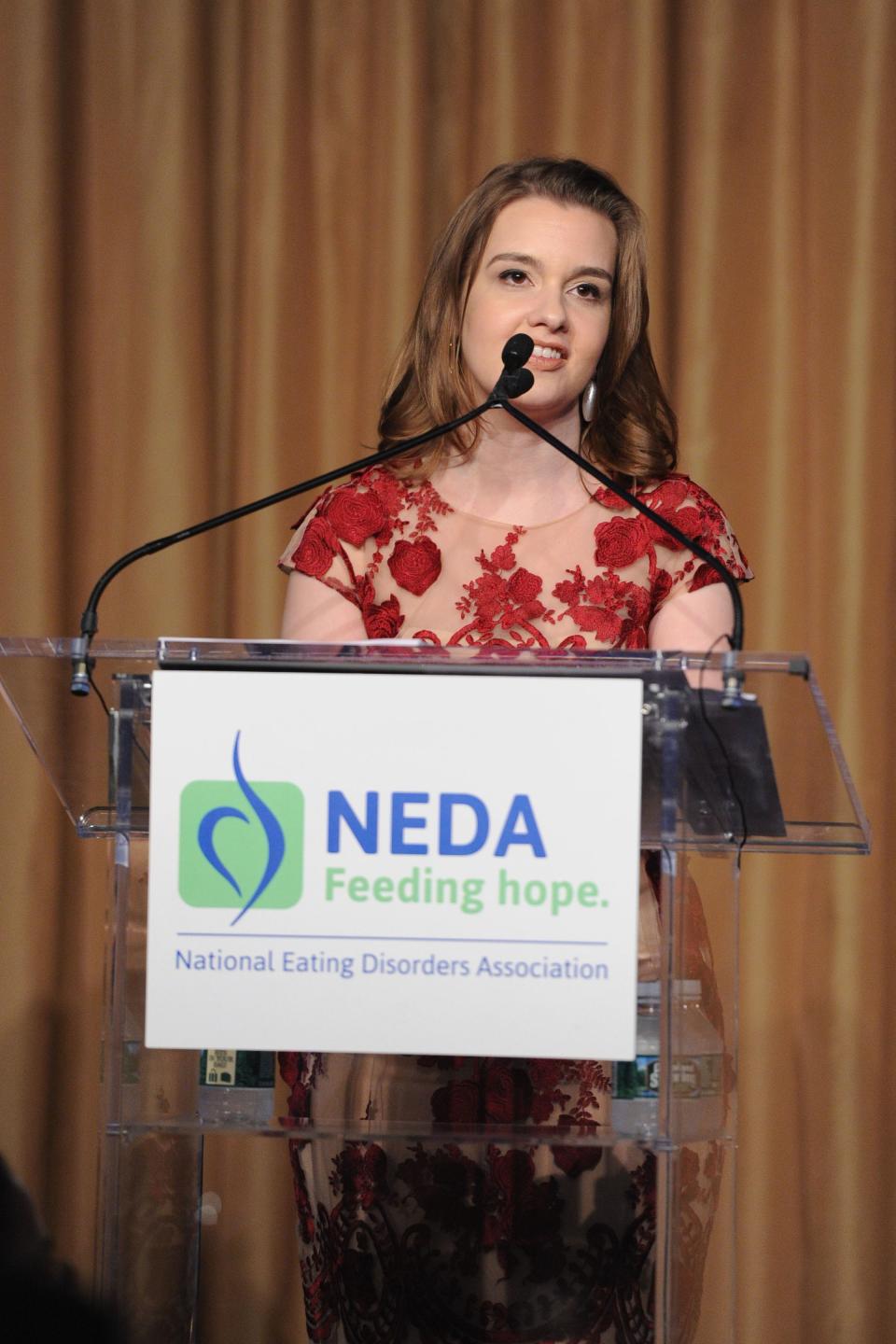As a child, I had an eating disorder. WW's dieting app for kids terrifies me for my child.
There were hundreds of them — tiny sheets of paper covered with numbers and careful calculations. They were stored in a box I kept on my shelf, right next to my collection of "The Baby-Sitters Club" books and dolls I had outgrown but wasn’t quite ready to part with.
This was my daily routine of tracking and recording every bite I ate — my secret stash of calories and fat grams. I was 11 years old.
By the time I was 13, I had a full-blown eating disorder. I was starving myself as I eliminated the “bad” foods I feared would make me gain weight. Then I moved on to binging and purging.
Today, there are more high-tech options for kids to criticize and track what they put in their body, including WW’s (previously known as "Weight Watchers") new app Kurbo, which is designed for children ages 8 to 17.
Instead of counting calories, kids can now track their consumption of foods that are categorized as green (good), yellow (be careful) and red (stop and think). There are other goals to choose from, too: increase your self-confidence, please your parents and have your clothes fit better. Promotional before-and-after photos of children describe weight loss “successes,” which will almost certainly be short term and likely followed by more weight gain.
Mountains of research show the dismal failure rates of weight loss programs — there is no long-term evidence showing that weight loss can be maintained in the majority of those who lose weight.
Diets aren't called 'diets' anymore
Studies show that dieting adolescents are twice as likely as nondieting adolescents to become overweight after five years, regardless of their beginning weight, and those who dieted moderately were five times more likely to develop an eating disorder than those who did not diet.
End the blame game: I have a mental illness. Don’t scapegoat, institutionalize people like me after shootings.
Kurbo’s marketing photos display smiling children at the edge of puberty. I am reminded of how insecure and desperate I was at that age for a solution that would make me feel better about myself. Weight loss wasn’t the answer, but that’s the message I was sold and bought. I am terrified for my 9-year-old daughter because the sales pitches are more confusing than ever and now targeting children her age.

Diets aren’t called diets anymore. Now it’s “health” and “wellness.” But it is evident — even if a green dot on an app like Kurbo says “healthy” instead of “low-calorie” or “fat-free” — that this is pushing diet culture on a child.
There is nothing wrong with kids’ growing bodies, but they are being told differently. By age 6, girls start to express concerns about their own weight or shape. An estimated 40% to 60% of elementary school girls are concerned about their weight or becoming too fat, according to "Body Image," a reference handbook published in 2004.
The stats increase for teens. In fact, 62% of high school girls and 28% of boys reported trying to lose weight in the past month in a 2002 study.
A concerning new trend: Selfies drive patients to my door. But don't go under the knife just yet.
To be sure, not every child who tracks their food intake diligently will develop an eating disorder. Eating disorders are complex biopsychosocial illnesses with connections to other mental health issues, including depression, anxiety, substance use disorder and trauma.
Some children are biologically and genetically predisposed to developing them. Consider the real risks of exposing those kids to an app that highlights weight loss “success” stories and correlates success in changing your body size to messages of health, self-confidence and acceptance.
It is a dangerous and potentially deadly mix.
Obesity isn't our only nutrition issue
An estimated 19% of kids ages 2-19 qualify as obese if they fall in the lowest or middle income group, according to the Centers for Disease Control and Prevention. Among kids ages 2-19 in the highest income group, nearly 11% qualify as obese.
WW and other adapters of "wellness", not weight loss, claim that they are offering a solution to address the childhood obesity epidemic. But eating disorders are a serious public health issue, too.
In the United States, 30 million people will struggle with eating disorders at some point in their lives. And anorexia nervosa has the highest mortality rate of any psychiatric disorder, according to the National Institute of Mental Health.

Not all bodies look the same, and they aren’t supposed to, either. The overarching cultural narrative about obesity treats higher weights in children as a straightforward individual issue of diet and exercise. Apps like Kurbo reinforce this toxic and oversimplified idea and ignore the natural diversity of body shapes that exists in the world. There are also many factors in relation to weight that are out of a child’s control.
When we hand children a mobile device and tell them to “fix” their bodies and improve their self-esteem by logging “green” foods and avoiding “reds,” we are setting them up to fail.
What about adolescents who have limited access to those so-called “green” foods or kids who are clinically depressed? How will this app affect children who endure daily teasing and bullying because of their size? Kids should hear that adults are working to make the world a safer and more accepting space for them to grow and thrive, not that the answer to all the challenges they face is up to them to manage. The answer is not weight loss or diet-culture forced onto a child.
Claire Mysko is the CEO of the National Eating Disorders Association. If you or someone you know is struggling with an eating disorder and are in need of support, please call the National Eating Disorders Helpline (800-931-2237) or text NEDA to 741741.
You can read diverse opinions from our Board of Contributors and other writers on the Opinion front page, on Twitter @usatodayopinion and in our daily Opinion newsletter. To respond to a column, submit a comment to letters@usatoday.com.
This article originally appeared on USA TODAY: Weight loss: WW's dieting app Kurbo risks vulnerable kids' health

